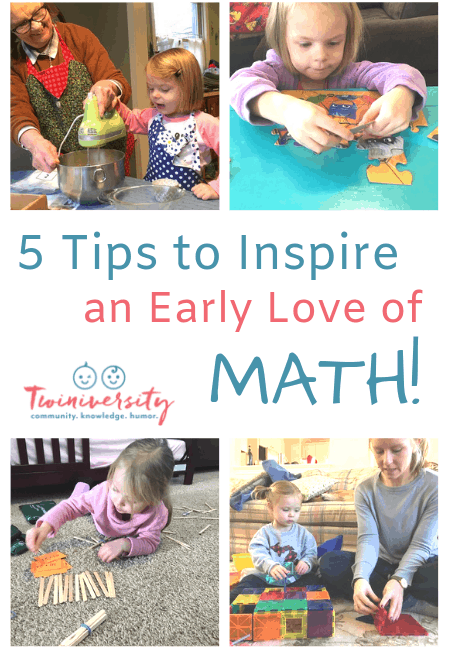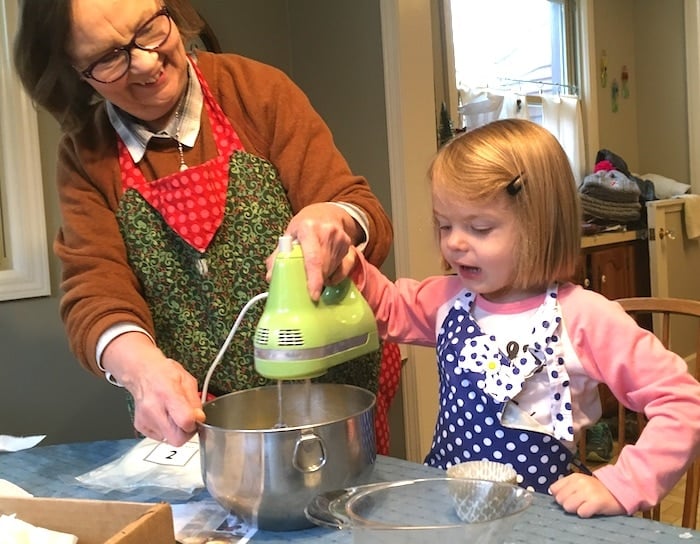Last updated on November 10th, 2023 at 03:16 pm
When I was a special education paraprofessional, there were days when all I had to say was “time for math” and there would be a full-on toddler-level tantrum, with kicking and screaming and pencils flying from my first grade student on the autism spectrum. I legitimately had to re-name “math class” as, “board games”, “art with shapes”, and “fun with numbers” to avoid the daily struggle to get in a math lesson. To be honest, with this level of reaction I prepared myself for the student to struggle in math, but that was definitely not the case. This first grader could skip-count like a third grader if we were just counting on a walk, and he could subtract like a champ if the subject matter was interesting and non-threatening.
Of course, this student is a special case and the most extreme example I’ve seen of a math aversion, but there is a hint of this phobia in most math classrooms, and even among adults. With a little practice, encouragement, and fun experiential learning opportunities, you can give your twins a head start on the path to being a competent mathematician instead of an irrational mess in the math classroom.
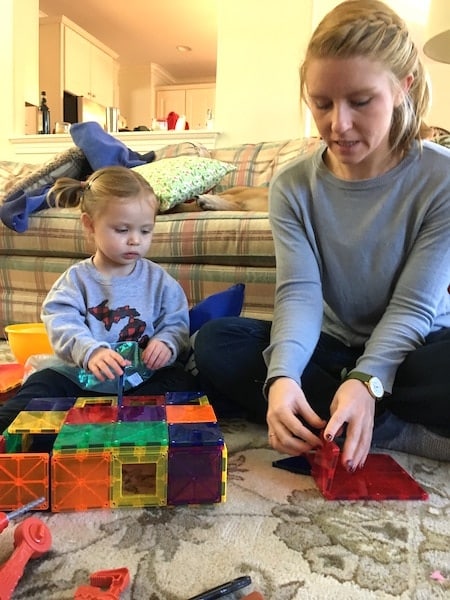
Before we dive into the how, let’s look at the why. There are so many reasons to support your child in their education in general, from basic self-confidence and self-reliance to strong scores on the SAT and scholarships to pay for college. But there is so much more to math than the materials that show up on the standardized test that many students dread.
As a math teacher, I am more excited to see a student who can interpret the data around them and make an educated decision, than the student that can memorize the rules for exponents. I am more proud of students that can problem-solve and think creatively than the students that ace the ACT. Math gives students logical reasoning skills that can be useful in their other academics and their everyday lives. I’ve often told students and parents that you may not use calculus after you graduate, but the process of learning how systems interact and how to analyze data will be valuable in any path you choose. So start early to build the skills needed to be a critical and mathematical thinker.
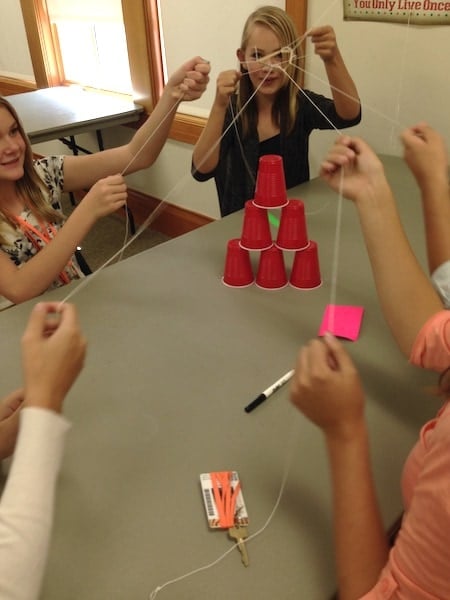
1. Play Games
Play games with your children! Seriously, it’s that easy. You can find great educational games like The Sneaky Snacky Squirrel Game and Qwirkle that build counting, matching, adding, and pattern skills, but you don’t have to get that fancy either. You can play traditional children’s games. Nearly any game you choose will require your child to calculate a score, find a pattern, or think strategically. All of these skills are beneficial in the math classroom. I don’t know if my dad intentionally talked basketball scores with me in elementary school to build my cognition, but I quickly thought of adding in terms of 2’s and 3’s due to the presence of basketball in the home. I think my husband may be pushing the concept of multiples of seven with watching and playing football with our girls. Adding some intentional conversation to the games that are already present in your house will help your twins realize the power and application of numbers in a meaningful way.
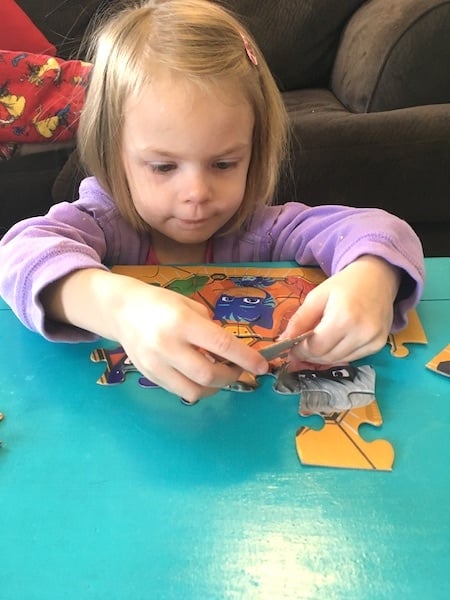
2. Do Puzzles and Build Together
Blocks and puzzles may seem like simple, traditional toys, but there are reasons that they have stood the test of time. With blocks, you can ask your children to identify by color, size, and shape, all of which are basic preschool skills. When doing this you can follow your child’s lead and only ask questions until they lose interest. Then the next time you get the blocks out, go to any challenging concept after an easy warm up. For example, if your child confused squares and rectangles one day, the next day ask to see a triangle first, then move on to squares and rectangles right after the success from triangles. To take it to the next level, start sorting blocks by an attribute like color and see if they can join you. Another major benefit to blocks is that they are an open-ended toy that allows children to imagine and create. This is a great activity for children to gain self-confidence.
Puzzles are a fantastic way to develop spatial reasoning and problem-solving skills. When children work on puzzles they need to look at how the pieces fit together and plan ahead which requires higher order thinking. I love to sit with my girls while they do puzzles and slowly flip the pieces and slide matches closer together, but keep my mouth shut for the most part to let them figure out as much as possible without my guidance.
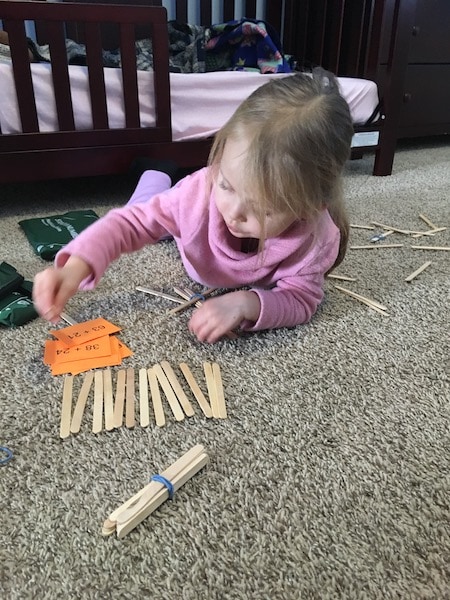
3. Look for Patterns
When I say patterns most of you will picture simple elementary standardized tests that have a square, triangle, circle, square, triangle, circle. But identifying patterns in Algebra and Calculus are valuable strategies for adolescents in the math classroom, that build from these basic skills that can be overlooked at times. So anytime you see that there are numbers going up by 2, or colors in artwork that follow a pattern point this out to your child and ask them what pattern they see. Give them a chance to complete a pattern you start with blocks or action figures. Meet them where they are and look for ways to notice the beauty and complexity of math surrounding us every day. (If you need help looking for patterns, Millie on “Team Umizoomi” is a great role model for preschoolers.)
4. Use Questioning and Proper Language in Everyday Scenarios
The difference between “two and two make four” and “two plus two equals four”, is minor on the surface, but it can help encourage children to use proper language and have a greater understanding of the academics they are seeing each day. I love when my girls surprise me by saying big kid things like, “let’s investigate” or “I prefer…” or “I have a hypothesis.” Simple language is not a bad thing, but you can help your children move to the next level of understanding by giving them the right words to describe everyday scenarios.
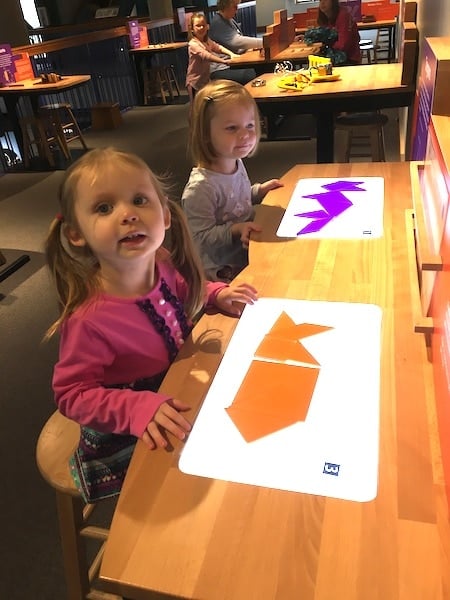
You can also ask your children to make mathematical observations in your everyday activities. For example, if you are visiting the aquarium and there are stingrays and baby sharks in a tank you can ask a lot of questions to see your children’s understanding. Start simple with, “What color animals do you see?” Then move to, “What shape are their eyes?” From there practice addition with, “How many sharks do you see? How many stingrays? And how many all together?” This is my favorite because I love seeing if the children are counting each question, or if they can count on from the first number to get the total, or just mentally add. Once addition is mastered you can try doubling questions like, “If each animal invited a friend to the tank how many would there be altogether?” Get creative and challenge yourself to ask a math question on each new adventure you do with your children. Eventually, you’ll find yourself asking great questions on a regular basis and your kids will rarely realize that they are practicing math at the park, library, play place, grandma’s house, zoo, or even Target.
5. Count, Count, Count!
I can remember on vacations as a little girl climbing up a long set of stairs to see a lighthouse that my dad would count all the steps. I thought he was ridiculous at first, but it would get me thinking about the numbers around me. He’d also ask me to count to 360 when something would be happening in six minutes, I’d often check his math to see if the numbers really made sense. Somehow my dad’s seemingly silly techniques encouraged me to major in math and see the amazing link between numbers and the world around me.
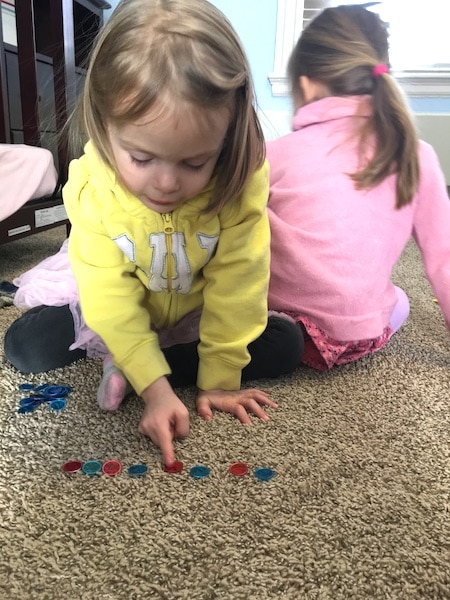
Start small, maybe it is counting stairs on just a short flight of stairs. If you sing lullabies you can vary it up and just count by ones, twos, or threes in a nice rhythm to soothe a baby. Maybe it’s role modeling counting to four to calm down (Thank you Daniel Tiger for, “When you feel so mad that you want to roar, take a deep breath and count to four.”)
As your children get a little bit more independent you can ask them to count to a reasonable number to wait for a treat or for a short re-set/time-out or even to play hide and seek. There are numbers everywhere! As your children master counting to three, move on to five, then ten, then twenty, then fifty, then one hundred. Once the regular counting to one hundred is strong you can skip-count or count by a different number like 2’s or 5’s (elementary math teachers will use this skill to teach multiplication!)
Bonus: Kickstarter Option
Not sure you want to lead the math lessons yourself? Start a few books and TV shows that are tested and approved by a math teacher. You can practice your math questioning alongside the characters in some of my favorite children’s books or shows.
Books:
- Bear Counts – Karma Wilson
- Spinderella – Julia Donaldson
- Iggy Peck Architect – Andrea Beaty
- Ten Pigs: An Epic Bath Adventure – Derek Anderson
TV Shows:
You Can Do This, Parents!
There is so much more to math than worksheets and rote memorization. Math is the building block for technology, science, and engineering. As much as it hurts me to admit that not every student should take calculus (I think this is such a fun subject!), a basic mathematical ability is needed to advance in many career paths and to engage in the everyday world.
Also, it is undeniable that many of the 21st-century skills students need to be successful in the evolving society are math-based, such as problem-solving, analyzing, and reasoning. If you have a math aversion of your own, focus on patterns or counting that doesn’t overwhelm you to start, and remember that math is just the general term for creating critical thinkers, problem solvers, and children that are aware of the world around them.

Becca Heldreth is mother to 18 month old fraternal twin girls. She has a master’s degree in education and is currently able to teach from home. Her class of two toddler girls and one dog is quite an adventure. Lessons are certainly more focused on sharing and petting the dog gently than on factoring polynomials. Becca and her husband pass along their passion for the outdoors to their twins through trips to the bouldering room, hiking trails, and bike rides.
Related Articles
- 5 Tips to Help Kids Reach Their Goals in the New Year
- 5 Steps To Advocate For Your Child In School
- 5 Ways to Prepare Your Kids for School Success
